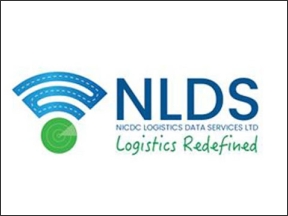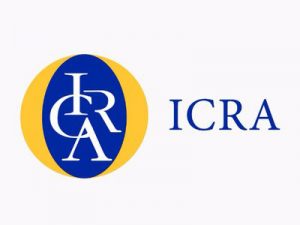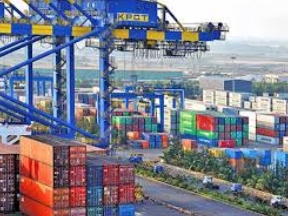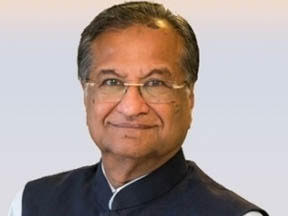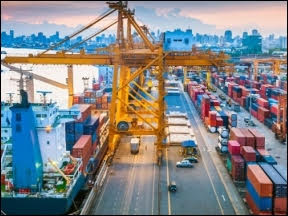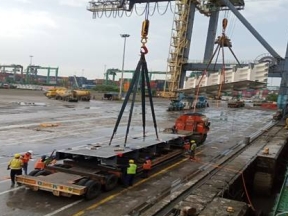Utilising its services to improve global logistics, NICDC Logistics Data Services-NLDS (formerly DMICDC Logistics Data Services, DLDS) has extended its services to Nepal and Bangladesh after the consent of Land Port Authority of India (LPAI) to install the RFID readers at Integrated Check Posts (ICPs) at India–Nepal and India–Bangladesh border. With this expansion, exporters and importers from Nepal and Bangladesh can track the movement of their containers through Logistics Databank Portal www.ldb.co.in and a mobile application named ‘NICDC-LDB’. The expansion includes ICPs, namely, Agartala-India-Bangladesh Border, Petrapole-India–Bangladesh border, Jogbani-India–Nepal border, Raxaul-India-Nepal Border With this coverage ICPs located at Agartala, Jogbani and Raxaul will help in road movement container tracking and Petrapole ICP will help in rail movement container tracking. Speaking on the development, K. Sanjay Murthy, IAS, CEO & MD, NICDC (National Industrial Corridor Development Corporation) and Chairman, NLDS says, “The new extension of services reiterates our vision and commitment of streamlining logistics across the country and the brand’s ambition to improve the EXIM trade, reduce the logistics cost and pave the way for India to become a logistics hub.” Ichiro Oshima, CEO, NLDS says, “Since its inception in Dec 2015, NLDS has played a vital role in enhancing the operations of Ports and Maritime Industry in India. While aiming at 100 per cent container volume tracking in India, this expansion will certainly mark a great milestone in bringing efficiency in logistics and supply chain industry.” Before NLDS came into existence, operators handled logistics independently through autonomous systems, which led to delays and inefficient tracking. Through its flagship product, LDB (Logistics Data Bank), NLDS streamlined container movement and today serves 25 port terminals while handling 96 per cent of the country’s …
Read More »IPA joins International Port Community Systems Association to ease trading across borders
The Indian Ports Association (IPA), an apex body of Major Ports under Administrative Control of Ministry of Shipping, Govt. of India, has become the latest member of the International Port Community Systems Association (IPCSA). Dr Abhijit Singh, Executive Director, IPA, states, “Minister of Shipping, Government of India desires Indian Port Community System (PCS1x) should constantly evolve to be the best in class PCS globally. Hence, in order to keep abreast of the technological developments happening globally it is important that IPA should become part of the international port community network by developing noble association with prestigious body like IPCSA. We endeavour to integrate with other international PCS to ease trading across borders. In fact, we wish to align PCS 1x to the 2030 vision of IPCSA.” “IPCSA is delighted to welcome the Indian Ports Association” said Hans Rook, Chairman, IPCSA. He adds, “The IPA brings with it their experience and knowledge on how to develop a National Port Community System. The inclusion of the Indian Ports through PCS1x platform into IPCSA is a new milestone in IPCSAs development and will support in the implementation of new global initiatives.” India is a nation that has been working for many years now on its digital infrastructure and enabling of e-governance. PCS 1x has been rolled out by IPA to offer a true single window for the port and maritime community for sharing data and information. PCS1x has grown in scope and penetration over the last year and a half with significantly better utilisation than its predecessor, which was deployed on premise at major ports in 2006. Since going live in December 2018, the new PCS1x has tripled the user base and reduced …
Read More »Ship charter rates to be exposed to volatility in the near term, demand outlook still remains muted: ICRA
Due to the COVID-19 pandemic, the shipping sector has been facing turbulence in the current year and the impact of containment measures adopted by major economies has weighed down on the demand. While demand contraction had happened across major segments like dry bulk, tankers and containers, the charter rates have seen steep volatility. However, the tanker segment (crude as well as products) had witnessed sharp increase during March and April, due to increase in demand for storage amid contango situation in oil prices and touched all time high rates, however with the weakening of contango situation, the storage play petered out and there has been steep decline in rates subsequently as the regular demand for transportation remains subdued. On the other hand, with easing of containment measures and some pickup in economic activity and demand, especially from China, there has been recovery in dry bulk rates in the last three months. Further, despite the demand remaining subdued for the container segment, there has been sharp increase in rates in the last two months, which can be attributed to supply management by liners. Hence, even though the demand outlook remains muted for the current year, the charter rates have been volatile. Sai Krishna, Assistant Vice President and Associate Head, Corporate Ratings, ICRA Limited commented, “Despite recovery in charter rates in some segments, ICRA believes that the charter rates will be exposed to volatility in the near term, as the demand outlook still remains muted. Any sustained improvement in charter rates will depend on stable recovery in economic activity and trade.” While factors like supply management and uptick in storage demand for crude and oil products can provide spike in rates, the …
Read More »Shipping community needs to come together and formulate means to eliminate threats: Shahab Al Jassmi
The global pandemic has severely affected businesses around the world. The maritime industry too has experienced a major downturn. Shahab Al Jassmi, Commercial Director of Ports and Terminals – DP World, UAE Region, said, “It is important for the maritime community to come together and formulate means to eliminate threats to the business. Over the last few months, we have realised the importance of having strategic foresight. Such unprecedented situations test the calibre of all businesses. For us at DP World, UAE Region safeguarding business continuity, while protecting our employees from the risk of the virus was a top priority. Additionally, our sustained investments in digital technology and automation made operations highly resilient.” Speaking about the roadblocks in business due to the global crisis Jassmi revealed key strategies DP World, UAE Region employs to overcome these challenges. He also shed light on the significance of embracing digital models of business to enhance the supply chain. Since the onset of COVID-19, DP World, UAE Region has been committed to facilitating an uninterrupted flow of medical supplies and essential goods. To ensure trade flow amid a deteriorating market, the company also introduced key digital initiatives with a focus on prudent cost management, better productivity, asset utilisation and automation processes. Their initiatives such as Jebel Ali Free Zone (Jafza) Customer Support, in addition to other measures like flexible monthly rental payments, deferred payments and choice of leasing warehouses on a short-term basis, have complemented the government’s strategy, boosting the maritime sector in the UAE and the Middle East region. Jassmi expressed his views at CEO Forum focusing on challenges and future opportunities for ports and shipping in the Gulf Cooperation Council
Read More »Trade associations appeal to the government to set up shipping regulator and control the freight charges
Amid the problem of container shortages that exporters are facing, several trade bodies have urged the Centre to set up a regulator to deal with the rising freight charges. Engineering Export Promotion Council of India (EEPC) claimed that shipping lines are demanding high freight charges as inward traffic from different countries, particularly from China, has declined for which the exporters are required to pay a higher amount for outbound consignments. “Imports from China have fallen and the liners have increased freight rates. No shipping company likes to sail empty after delivery of export consignments,” Sanjay Budhia, Chairman, CII National Committee on Exports and Imports told PTI. He adds, “All the exporters across the country are facing this problem. This is leading to a situation where cargo is lying at ports. We urged the government to set up a shipping regulator to control the freight rates. Exports have started to pick up despite the coronavirus crisis.” After contracting for six months in a row, the country’s exports grew by 5.27 per cent to USD 27.4 billion in September. The shipping companies have raised freight rates due to falling imports from China as liners do not have much cargo while they are returning, an official of the engineering exporters’ body said. “This is making Indian exports uncompetitive in the global markets,” an EEPC official said.
Read More »Container availability, currently a challenge for export sector: President, FIEO
According to Sharad Kumar Saraf, President, FIEO, non-availability of containers for the export sector is posing a serious concern for meeting delivery commitments of foreign buyers. He said , “From the last couple of months, in spite of offering space for three to four weeks ahead, shipping lines are shutting out the containers abruptly giving reasons that the vessels are full. The sea freights have also started increasing gradually since July and all the shipping lines have increased the freights by 20 per cent to 40 per cent depending on the destinations. There is a need for a regulatory agency for the shipping sector and we expect that the proposed National Logistics Efficiency Advancement Predictability and Safety (NLEAPS) Act would be formulated and implemented soon to protect the exim sector from such sudden and abrupt changes.” Saraf further stated that exports have started picking up and our merchandise exports turned positive for the first time in the last seven months registering a growth of about 5.3 per cent in the month of September 2020. Therefore, this important component of export logistics needs immediate attention else our exporters would not be able to capitalize on the new opportunities. FIEO Chief also advocated that the government order to pay terminal handling charges to ports directly may be implemented across ports as it will bring down logistics costs for the export sector and make them more competitive.
Read More »General cargo throughput likely to witness 6-8% contraction for 2020-21, sustainability remains a concern: ICRA
With cargo at Indian ports witnessing Y-o-Y decline of nine per cent each in July and August, after severe contraction of ~22% in Q1 FY2021 due to the impact of Covid-19 pandemic, the Indian Port sector is witnessing deceleration in cargo decline in Q2 FY2021. The recovery has been relatively better at non major ports. The recovery trend is driven by easing of containment measures and uptick in economic activity. The major cargo segments impacted are POL, coal and containers; while fertilizers and iron ore have bucked the trend. Regarding the developments, Sai Krishna, Assistant Vice President and Associate-Head, Corporate Ratings, ICRA says, “The deceleration in cargo contraction is a favourable trend, but recovery in certain segments like POL, which was expected to be faster with easing of lockdown, has not materialized in line with expectation due to continued subdued demand. Further, the recovery in segments like coking coal and containers may be prolonged compared to other segments. Also, the recovery trend in certain segments like thermal coal has been volatile at non-major ports. Hence, the sustainability of recovery trend remains a concern at present and the sector is not out of the woods. ICRA reiterates its expectation that while general cargo throughput may witness ~6-8% contraction for full year 2020-21, the container segment may witness a decline of 12-15% during the same period.” While, the cargo performance has been subdued, there has been traction on reform front with passage of Major Port Bill 2020 in September 2020, after witnessing long delays since its initial introduction in 2016. Commenting on the same, K. Ravichandran, Senior Vice President and Group Head, Corporate Ratings, ICRA adds: “The passage of the bill is …
Read More »JNPT accomplishes 95% of cargo throughput against September 2019
Jawaharlal Nehru Port Trust (JNPT) handled 3,80,384 TEUs in September 2020 which is 95 per cent of cargo handled in September 2019 (400,365 TEUs). There has been increase of 7.8 per cent in throughput as compared to August 2020 (352,735 TEUs), this steady surge in cargo handling month on month indicates early signs of recovery which is very significant during the ongoing pandemic that has affected business across India. JNPT handled 1,925,302 TEUs (1.92 million TEUs) and 797 vessels during the half year ending September 30, 2020, as against 2,572,810 TEUs (2.57 million TEUs) handled in the same period during the previous year. The overall traffic handled in current financial year (April-Sep) was 26.93 Million Tonnes as compared to 34.41 Million Tonnes handled in the same period during previous year. At the Liquid Cargo Terminal, the port has been handling essential commodities like LPG, High speed diesel, Motorspirit and Edible oil which is further supplied to the states of Maharashtra, Gujarat, Karnataka, Goa, Madhya Pradesh and Delhi. In September 2020, JNPT handled discharge of 92786 MT of LPG in six vessels, by giving priority and timely berthing to the LPG vessels for fulfillment of Pradhan Mantri Ujjwala Yojna. Total LPG handled in the current financial year till September is 4, 59,283 MT as compared to 4, 19,562 MT handled in previous year which is an increase of 9.5 %. “The international maritime sector is evolving rapidly and the business demands are constantly changing and hence it is imperative that we also develop our capabilities to stay ahead in the competitive market. At JNPT, various initiatives like Direct Port Delivery, Direct Port Entry, ITRHO, ITT have helped in reducing the dwell …
Read More »Adani Ports acquire Krishnapatnam Port at enterprise value of Rs12 crore
To have a controlling stake of 75 per cent in KPCL from the CVR Group and other investors, Adani Ports and Special Economic Zone (APSEZ) has completed the acquisition of Krishnapatnam Port Company (KPCL) for an enterprise value of Rs. 12,000 crore. In FY21, the port is expected to generate an EBITDA of approximately Rs.1,200 crore, resulting in an acquisition EV/ EBITDA multiple of 10x. This acquisition will accelerate APSEZ’s stride towards 500 MMT by 2025 and is another step in implementing APSEZ’s stated strategy of cargo parity between west and east coasts of India. Karan Adani, Chief Executive Officer and Whole Time Director, APSEZ said, “I am happy that KPCL the second largest private port in India has now become part of APSEZ portfolio. This transformational acquisition enables us to roll out world class customer service to an increased customer base and provide pan India solution to them. Our experience of turning around acquisitions like Dhamra and Kattupalli ports will enable us in harnessing the potential of KPCL. We will target to enhance throughput at KPCL to 100 MMT by FY25 and double its EBIDTA by FY23. With a vast waterfront and land availability of over 6,700 acres, KPCL is capable of replicating Mundra and would be future ready to handle 500 MMT. We will replicate our operations and maintenance philosophy at KPCL, continue to focus on environment, reduce emission levels and have zero tolerance for fatalities and thus improve returns to stakeholders.”
Read More »JNPT handles project cargo of ‘Mumbai Trans Harbour Link’ in record time of 35 hours
Jawaharlal Nehru Port Trust (JNPT) successfully executed the handling of MV PIONEER DREAM carrying project cargo for Mumbai Trans Harbour Link Project. The Mumbai Trans Harbour Link project will provide direct access to Navi Mumbai International Airport, connecting JNPT and will also provide a convenient gateway to the Pune expressway. This is a major achievement for JNPT as the connectivity of Mumbai to Navi Mumbai through Trans Harbour Link is crucial for the socio-economic development of Mumbai and its suburban areas. The port unloaded 84 packages consisting of 1033MT of columns, supporting structures, and girders—a compound structure used to build bridges, at Shallow Water Berth on September 23 in a record time of 35.30 hours. The cargo loaded from Hai Phong Port is imported by L&T -IHI Consortium with L&T being the consignee. The delivery of Fabricated Orthotropic Steel Girders will enable faster construction work and lessen deck related on-site activities. M/s Samsara Shipping India is the vessel agents and M/s BDP International is the logistics support provider for the consignment. The Mumbai Trans-Harbour link will be the nation’s longest sea bridge to connect the city’s twin suburban Navi Mumbai. The 22-kilometer bridge, connecting Sewri in mainland Mumbai to Nhava Sheva in JNPT, Navi Mumbai, will be built on more than 10,000 girders and nearly 16.5 km of it will run over the sea and rest over land. Once operational, the bridge is expected to cut travel time between south Mumbai and Navi Mumbai. With cargo handling like this, JNPT has firmly anchored itself as the major catalyst for trade and commerce in the country and is strongly committed to provide seamless services to the growth of the nation.
Read More » Cargo Breaking News
Cargo Breaking News
